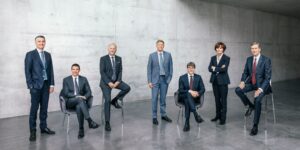FEELER FAITH: ALL THINGS ARE POSSIBLE
The automation and performance of Feeler precision lathes, vertical and horizontal machining centers are driving the value engine of diversity at ETM Industries, a machine shop that includes work on the NASA international space station and Boeing aerospace business.
Posted: March 7, 2011
The automation and performance of a fleet of precision lathes, vertical and horizontal machining centers are driving the value engine of diversity at ETM Industries, a machine shop that includes work on the NASA international space station and Boeing aerospace business.
If diversity is the key to success for many businesses in the current economic climate, then variety is certainly the spice of life at ETM Industries Inc., a progressive machine shop in Renfrew, Ontario. Things didn’t start out this way. Edward Legree didn’t necessarily design an operation where “all things are possible” when he founded ETM in 1977, but the transition evolved over time as the company steadily grew, changed hands and is now jointly owned by president Jeff Campbell, general manager John Robertson and vice president Jean Paul (“JP”) Leclerc.
When ETM experienced a significant growth spurt in the late 1990s due to aerospace and telecommunications industry expansion, the shop became a multifaceted manufacturing operation that provided customers with the most practical, efficient and cost-effective solutions, whether they were metal or plastic parts, tooling, or even engineering services. Anything was possible. Today, that mentality carries 80 employees who conduct operations in two buildings on a single campus that houses approximately 80,000 sq ft of manufacturing space.
“We are now almost like several separate businesses – CNC machining, injection molding and tooling, moldmaking and EDM,” observes Robertson. “Each is their own entity, yet they all work together and support each other. Early on we saw opportunities to add value for our customers by offering tooling and prototype work, plastic or metal parts, even casting or painting. It is difficult to pigeon-hole us on what we do, but when customers arrive at our facility, the light goes on and they see all the possibilities. For example, sometimes a customer wants to change a part from metal to plastic, depending on their industry and the application. In fact, almost a third of our business is now injection molded parts. We’re just crazy enough to work on anything for our customers here.”
In other words, standard parts at ETM are an anomaly. The industries served by this diverse business model vary from military to mining to nuclear, automotive and telecom. However, aerospace applications play perhaps the most prominent role. One distinguished example of aerospace prowess was a NASA international space station project where ETM manufactured components that were launched into space in early 2003 for the world’s first commercial facility for the international space station. The company fabricated the parts and assisted with the assembly of two major systems of the Space-DRUMS facility located in Newfoundland – a Material Handling System (or robotic arm) and a Pellet Storage System.
“We also do lots of Boeing commercial work here,” notes Robertson. “For example, we will be making many parts for the Dreamliner 787 program.” Aerospace work obviously requires stringent certification and quality control. Being AS9100B and ISO9001:2000 registered, the plant remains in step with the latest certifications. Naturally, aerospace components have tight tolerances – almost all the work is at tenths accuracy levels. To meet the demands of all of this precision work, ETM relies on a full battery of 22 mills and lathes to crank out parts. A fleet of 20 of these machine tools –seven lathes, eleven vertical machining centers and two horizontals – are Feeler machines.
The company purchased their first Feeler machine tool in 1997, an FV-1100 vertical machining center recommended by Ottawa machine tool distributor Legere Industrial. “We relied heavily on Legere’s advice. They studied our applications and determined that Feeler would be a reliable, repeatable machine for a very reasonable investment,” recalls Robertson. “It was the right call. The Feeler machines are very reliable, repeatable and the price is right.”
Every time a part must be touched, cost is added to it. After the addition of their first few lathes, ETM quickly realized the company could dramatically reduce costs and improve their efficiency through automating and consolidating machining operations with multitasking turn/mill centers. “We now routinely manufacture complete parts in a single set-up that previously required operations on four separate machines,” explains JP. “We substantially reduce cycle time and improve accuracy because the parts are not being moved from machine to machine.”
This led the shop to capitalize on the benefits of automation by investing in manufacturing cells. “We have a full manufacturing cell solution in one of our palletized 800 APC vertical machining centers. Based on how the equipment is set up and tooled, one pallet can complete its machining cycle while another pallet is simultaneously being staged. We gain maximum cycle time reduction and optimum spindle machining time,” remarks JP.
Dennis Huckabone, the engineering manager at ETM, offers strategic insights into how having a common fleet of machine tools has simplified manufacturing, boosted productivity and made a difference on the shop’s bottom line. “The direct-drive spindle these machines use is exceptionally smooth and quiet. Their smartly designed work envelopes come in handy when machining different styles and sizes of castings. The large envelope helps us use the 4-axis set up to its full capabilities.”
Huckabone pointed out how these machines are designed for ease of operation. “The base machine parameters are integrated with the controls to make them easy to manipulate. The Fanuc controls are familiar and easy for our machinists to operate. Because each machine is similarly set up, the results are easy to predict. They all respond very well to operations that may normally require some trial and error. For example, deburring the lead of a thread right to customer specifications is easily accomplished on our lathes.”
Huckabone is impressed at the savings generated by the machining speed and tool changeover time on these machines. “At 2000 ipm (on some of these machines), the rapids are fast. Tool changeover is exceedingly quick – ten times faster than a block style turret machine we have. In fact, we have a family of parts that we machine on these lathes where the set-up is now achieved in minutes. We calculated that over 300 hours per machine were saved in one year on five machines, a total of 1,500 hours. This makes a huge impact on spindle productivity . . . and our bottom line.”
These diverse machining capabilities are the engine that is driving ETM’s success. “We cannot afford any downtime in our operation,” states Robertson. “Machine reliability is absolutely critical. Our machines have excellent rigidity and require very little maintenance, whether mechanical or electric. That weighs heavily in our equipment selection criteria.” Another contributing factor to reliability is outside machine support and applications engineering. “We are excited to hear that Methods Machine Tools, Inc. (Sudbury, MA) is now the exclusive North American importer of Feeler machines. Their engineering, applications expertise and their Feeler-Methods line provides us with a reliable, high performance, value-centric machining solution for the foreseeable future,” says Robertson.
As the economy recovers and business picks up again, everyone is wondering what the next manufacturing feat will be at ETM. One thing is for sure, with their faith sailing in this fleet of precision machine tools, all things are possible.
Methods Machine Tools, Inc., 65 Union Avenue, Sudbury MA 01776, 978-443-5388, Fax: 978-440-9405, www.methodsmachine.com/FEELER.













